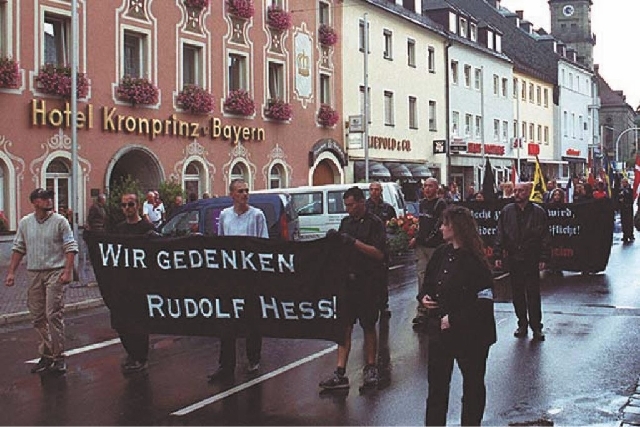Ex-Nazi shrine turns to immigrants for salvation

WUNSIEDEL, Germany — A small town in Germany that once was a pilgrimage site for neo-Nazis is now welcoming jobless foreigners with open arms.
A dozen Spaniards affected by record unemployment in their home country have made their way last year to Wunsiedel on the German-Czech border. The town, nestled in the north Bavarian hills mountains, was best known as the burial place of Adolf Hitler’s deputy Rudolf Hess, drawing annual far-right marches until authorities put a stop to them in 2005.
Now Wunsiedel has become an example of how the jobless of southern Europe can be helped to find work in the north, where low birthrates and continued economic prosperity have created a labor shortage.
Wunsiedel needs to recruit outsiders because the town’s population is shrinking – just 9,500 live here now. The town wants to grow again and needs to reach at least 10,000 inhabitants to turn the downward trend around.
Bernd Birke, the owner of an electrical firm in Wunsiedel – where the unemployment rate is 5.6 percent – traveled to Padron in Galicia in Spain – where about one in four people are out of work – in March 2012 to find workers willing to relocate to Germany.
Last year alone, almost 19,000 people emigrated from Spain to Germany.
Birke needed more trained electricians than he could find at home. But he didn’t expect the overwhelming response he got from the unemployed in Padron.
“We went to Spain with a queasy feeling,” said Birke. “Nobody had any kind of experiences with such a project, whether it could be successful or not.”
More than 200 people desperate to find work gathered in Padron’s town hall, and each vacancy received several applications on the spot.
The plan to recruit workers in crisis-hit Spain was hatched by Bernd Schoeffel, Wunsiedel’s deputy mayor. Schoeffel recalled how about 30 years ago an influx of “guest workers” from Galicia filled a labor shortage in the local ceramic industry.
“Of the 12 people we brought to Wunsiedel, 10 are still here,” said Schoeffel. “The road was not straight, but our experiment is successful.”
It helped that Wunsiedel made a big effort to welcome the newcomers. The town bought and renovated a house right in the city center that would serves at the immigrants’ first home until they can find their own accommodations.
Schoeffel himself helped to put up names on the doors of the immigrants.
Hospitality to foreigners was not always what the town of Wunsiedel was best known for.
In 1987, Hess died in a Berlin prison after serving a life sentence handed down by the Nuremberg war crimes tribunal after World War II. At his request, Hess was buried in Wunsiedel where his family had a vacation home.
For years, neo-Nazis gathered each year at the anniversary of his death, attracting counter-demonstrations by anti-Nazis. To the relief of local authorities, Hess’ remains were exhumed in 2011, cremated and scattered at sea.
Economic necessity has helped change opinions.
Angel Morales had been hunting for work for months before he met Birke. His parents had once worked abroad too, in Switzerland, but returned home so their children could grow up in Spain so the idea of pulling up stakes for a new country wasn’t entirely foreign to him.
“This project was introduced to me, and it seemed interesting because it is a way of learning another language, another culture and another way of working,” Morales said at Birke’s factory. “And now I’m here. I am very happy, and happy to get to know other people, another way of working, and at the moment I like it.”
Back home in Spain, Morales’ mother Mercedes said her son had little choice but to seek work where he can find it – even abroad.
“A few years ago nobody imagined this could happen because the country was alright, there was work for everybody,” she said at her home near Padron. “Ours is a beautiful country, a cheerful country, where everybody would love to have a job to earn a living. But if that’s not what happens, then we have to go and look wherever jobs are, that’s normal.”
However, Wunsiedel’s hospitality to foreigners has run into some opposition. Not everyone in the town likes the idea of importing foreign labor, saying the jobs should go to unemployed Germans first. But Birke said he tried unsuccessfully to find skilled workers in Germany.
Businessman Birke considers the project a success. All Spanish workers at his company get an unlimited work contract. For deputy mayor Schoeffel the future of his town is wide open.
“I always say as long as people cannot imagine that a bullfight could take place here at our market square the creativity of the people running our town is needed.”
—
Frank Jordans in Berlin and Iain Sullivan in La Coruna, Spain, contributed to this report.












